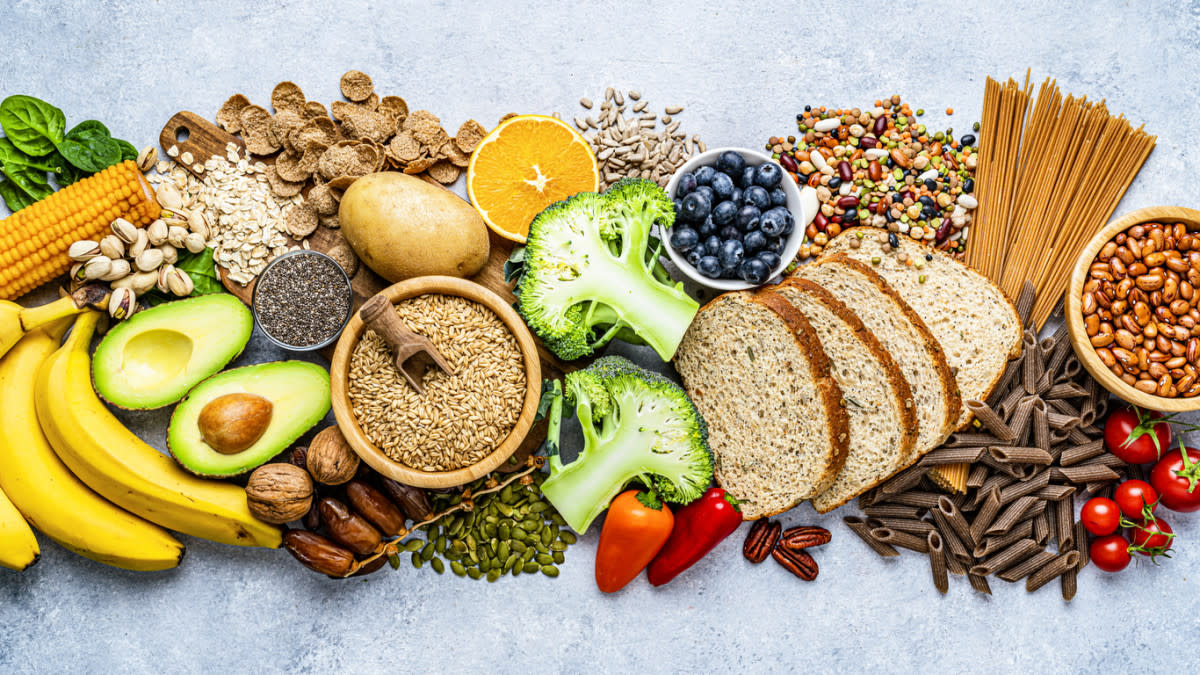Following This Type of Diet Can Cut Your Risk of Early Death by One-Third, According to New Research

If there was a way to lower your risk of the leading causes of death, you’d want to know what it is, right? Fortunately, there is a way to do exactly that and it’s not in the form of a pill or something that’s only accessible to the extremely wealthy. According to a new study published in The American Journal of Clinical Nutrition that took into account data from more than 200,000 people, following a way of eating called the "planetary health diet" can cut the risk of early death by 33%.
What is the planetary health plan and how is it different from other often-recommended diets? Keep reading to find out.
Related: If You Want to Live to 100, Here's the Surprising Thing to Prioritize
What Is the Planetary Health Diet?
Dr. Nate Wood, MD, MHS, an Instructor of General Medicine and the Director of Culinary Medicine at Yale School of Medicine, explains that the planetary health diet is a form of plant-based eating that prioritizes foods that are good for the planet and minimizes foods that aren’t. “What is exciting for those of us who care about both our personal health and planetary health is that a diet that is the best for the planet is also best for the body,” he says.
Dr. Wood explains that the planetary diet is a way of eating that prioritizes fruits, vegetables, whole grains, legumes, nuts and seeds, while minimizing foods that take a larger environmental toll, like beef, lamb, and poultry.
“The planetary health diet differs from other healthy diets in its specific focus on sustainability and health. While it emphasizes minimally processed plant foods like vegetables, fruits, whole grains and nuts, it also allows for modest consumption of meat and dairy products,” says Martha Theran, RD, a registered dietitian and educator at the Pritikin Longevity Center. She explains that this flexibility distinguishes it from vegetarian diets, which typically exclude meat entirely.
Related: 'I've Studied Longevity for 30 Years—These Are the 5 Foods to Avoid if You Want to Live to 100'
How can this way of eating drastically cut down the risk of an early death? Dr. Wood and Theran both say that there are several reasons for this. One is because it keeps the consumption of meat high in saturated fat to a minimum. “Land animals contain higher percentages of saturated fat [than seafood]. Eating saturated fat raises LDL cholesterol, which increases the risk of heart disease, stroke and other related diseases,” Dr. Wood says. He adds that plant-proteins and seafood, on the other hand, contain unsaturated fats, which is good for the heart and brain, and protects against chronic inflammation.
Theran says that another reason why this way of eating protects against early death is because plant-based foods are rich in nutrients, including antioxidants and fiber, which are linked to longevity. She adds that eating a primarily plant-based diet is good for gut health, which is key for staying healthy. “A healthy gut microbiome, fostered by this fiber intake, is pivotal in promoting longevity. It supports overall health and longevity by reducing inflammation, enhancing immune function and fortifying defenses against age-related diseases,” she explains.
Tips for Putting the Planetary Health Diet Into Practice
Knowing about the planetary health diet is one thing, but consistently living it out is something else entirely. If you are used to making meat the center of most (or all) of your meals, switching to a primarily plant-based diet can be challenging. To make it easier, start transforming your diet in steps instead of making a drastic change that may be overwhelming to stick with. “Aim for at least one plant-based meal a day,” Theran recommends.
If you are used to eating a lot of meat and want to start eating plant-based, it’s natural to gravitate toward meat substitute products. While Dr. Wood says these substitutes are certainly better for the environment than meat, he says there’s a wide range in how healthy they are. To find meat substitute products that are as healthy as possible, he recommends reading the ingredients list and choosing products made of nutrient-rich foods like beans, legumes, soy, nuts and seeds, and not made with inflammatory oils or additives. He also says to check the sodium and saturated fat content; too much of either means it isn’t a healthy choice. (The American Heart Association recommends keeping sodium intake under 2,300 milligrams a day.)
Both experts also say it’s also important to keep foods high in added sugar to a minimum. “Foods high in added sugar contribute [to consuming] excess calories without essential nutrients, leading to weight gain and increased risk of obesity, type 2 diabetes and cardiovascular diseases. These conditions are significant contributors to premature death and reduced longevity,” Theran says. Dr. Wood adds to this, saying it’s best to eat foods that are naturally sweet, like fruit, because they are paired with fiber (which prevents them from raising blood sugar as much) and other nutrients.
As the latest scientific study has shown, eating a primarily plant-based diet is good for both the planet and health—it’s a win-win! There’s no reason not to give it a try.
Next up, find out what vitamin you should consider taking if you want to live to be 100.
Sources
Dr. Nate Wood, MD, MHS, Instructor of General Medicine and the Director of Culinary Medicine at Yale School of Medicine
Martha Theran, RD, registered dietitian and educator at the Pritikin Longevity Center
